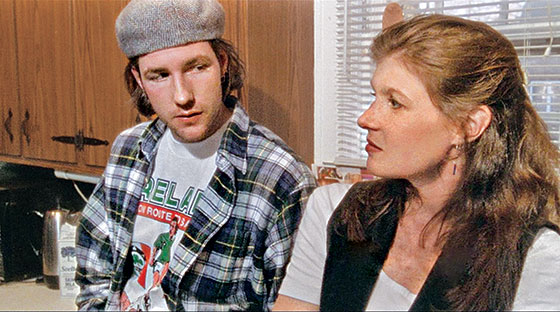 |
Burns and Britton in The Brothers McMullen, 1995.
(Photo: Courtesy of Brothers McMullen Productions) |
I had been pounding the pavement a lot in New York — had just been doing plays my whole life and had always loved doing it. But you know, there was always that sense of doubt. I distinctly remember being in acting classes watching people do scenes, and sometimes they weren’t very good. And I remember thinking, “Oh my gosh, there is that person doing that scene, and they are in acting class and they paid money and they’re here and that is not good. I mean, they are not pulling it off, and what about me? Maybe I’m like that? Maybe I’m actually terrible and I’m just wasting my time?!” So that was a pretty prominent feeling, which came along with a lot of years of rejection and thinking maybe I’m just one of these people who is a little misguided.
The Brothers McMullen was kind of my big break. It was a movie written and directed by Ed Burns, and it was definitely his first big break as well. But that movie took a long time to shoot, and there was never any money involved. It was really just a labor of love, and we were a bunch of struggling actors just wanting to do our craft, and so we would get together and rehearse scenes and talk about the characters and sort of just play around. There was something about the camaraderie of creating something together and working with a director who was very, very collaborative and very open to everybody kind of pitching in that’s very empowering. And so there was something about that process that helped me to get a little bit braver and feel a little more confident.
Not to mention the fact that I walked into the audition, had no investment in the movie whatsoever, didn’t know anything about the movie, the script, Eddie Burns, and he hired me on the spot. So right from the beginning, I had this sense, “Oh, he believes in me.” Already I felt like, “Oh, okay, maybe I have something to offer here.”
Eddie shot it at his house, and he was using quote-unquote “borrowed,” or stolen, film stock from Entertainment Tonight, where he worked as a PA. Whatever he could get his hands on. There was no crew. His mother would make us corned beef and cabbage — that was the catering. But there was something so pure about it, because we got so much time to rehearse. We didn’t have that much time to shoot, but we took a lot of time rehearsing. We’d all meet up at ten o’clock at night and drink beers and rehearse scenes after our day jobs. It was very much like theater in that way. And I was able to continue my understanding of what theater is by maintaining this fourth wall, because the cameras were almost inconsequential during the shoot. It was only after that I realized, “Oh, you really have to figure out how to shoot in front of a camera,” because it’s a different speed than being in the theater. But Eddie was a director who wanted our opinions about things. He would say, “What do you think she would say here?” And as a young actor, to have a writer-director want my opinion about a character? That kind of collaboration is such an empowering thing, because we have the ability to really lift each other. It was my first experience of that. And it was one of those early moments where I had the experience of wanting to find where this character was similar to me, what parts of myself could I use to make this character be more authentic?
When he finished the movie, he ran into Robert Redford and he basically handed him the movie and said, “Hey, will you look at my movie? I’m an independent filmmaker.” And so Redford watched the movie, and I’ll never forget when I found out that Redford was going to watch this movie that we’d done, and I was horrified, because I thought, “Oh my gosh, Robert Redford is going to see what a terrible actor I am!” In fact, that’s not what happened.